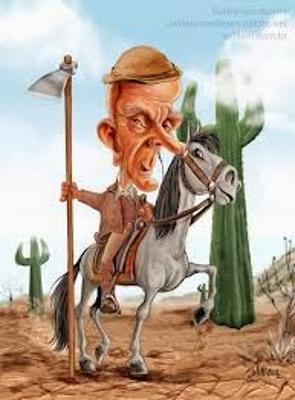
One day Buddha came into his assembly of the monks. His sannyasins were sitting and waiting for him. They were puzzled because this was for the first time that Buddha had come with something in his hand -- a handkerchief. They all looked at the handkerchief What was the matter? There must be something special in it. And Buddha sat on the platform and rather than starting speaking to the assembly he looked at the handkerchief, started tying a few knots in it, five knots in all. The whole assembly watched -- what is going on?
And then he asked the assembly, "Can anybody tell me: is this handkerchief the same as it was before the knots were tied?"
Sariputta said, "This is a tricky question. In a way the handkerchief is the same because nothing has changed, in a way it is not the same because these five knots have appeared which were not there before. But as far as the inner nature of the handkerchief is concerned -- its nature is concerned -- it is the same; but as far as its form is concerned it is no more the same. The form has changed: the substance is the same."
Buddha said, "Right. Now I want to open these knots." And he started stretching both ends of the handkerchief farther away from each other. He asked Sariputta. "What do you think? By stretching farther will I be able to open the knots?"
He said, "You will be making knots even more difficult to open because they will become smaller, more tighter. '
Buddha said, "Right. Then I want to ask the last question: what should I do so that I can open the knots, the tied knots? How I can untie them again?"
Sariputta said, "Bhagwan, I would like first to come close and see how in the first place the knots have been tied. Unless I know how they have been tied it is difficult for me to suggest any solution."
Buddha said, "Right, Sariputta. You are blessed, because that is the most fundamental question to ask. If you are in a certain fix, the first thing is how you got into it rather than trying to get out of it. Without asking the most fundamental and the primary question, you will make things worse."
hans-wolfgang - am Donnerstag, 30. Januar 2014, 22:56 - Rubrik: Tao
noch kein Kommentar - Kommentar verfassen

If I look at man just from the outside, I cannot say that if man is being abolished there is some harm -- "It is good, good riddance. Skinner is right. The earth will be better; at least, more silent. Nature will be happier." But if I look at man deep, in his infinite depth, then without man the earth may be silent, but that silence will be dead. It will not have any music in it. It will not have any depth in it. Flowers will be there, but they will not be beautiful anymore. Who will feel their beauty? Who will know their beauty? Birds will go on singing, but who will call the singing poetic, mysterious? Trees will be green, but will not be green at the same time, because that greenery has to be recognized by a deep resonance of the human heart.
hans-wolfgang - am Mittwoch, 25. Dezember 2013, 22:20
noch kein Kommentar - Kommentar verfassen

All the melodies and modes and their modifications are born in the East. These are the extensions of the experiences of the absolute being in the form of sound. Musical compositions, as well as all dance forms, originated in temples and later on developed elsewhere as specific arts. It was only in the temple that a devotee experienced the effects of sound in its innumerable variations -- so many that it is difficult to keep any count. You may wonder if temples can be used today in these changed times. Yes, it is possible, but the conventional orthodox priest who is in the temple today will not be able to explain what was happening and how, in temples in ancient times. He still has the key but he does not have any idea of the hidden secrets behind it. The whole philosophy and science of temples can still be of use today. And we can create better temples now because we have better building materials. We can set up a whole sound system in such a way that sound can be magnified a thousand fold. Walls can be made that are so sensitive that if you chant the mantra "Aum" once, the walls will echo it thousands of times. The new man is an absolute necessity now because the old is utterly rotten. The old is continuously in conflict within himself; he is fighting with himself. Whatsoever he does he feels miserable. If he follows his own inner voice he feels he is going against the society, against the powerful people, against the establishment. And that establishment has created a conscience in you; that conscience is a very tricky procedure, a strategy. It is the policeman inside you, implanted by the society, who goes on condemning you that: "This is wrong, this is not right. You should not do it, you should feel guilty for it -- you are being immoral."
It is a well-known fact that somewhere in the past, one hundred thousand years back, there were huge animals, far bigger than elephants, ten times bigger than elephants. What happened to those huge animals? They suddenly disappeared from the earth; only their skeletons are discovered. What calamity happened? No calamity from the outside, but they became too huge. The burden of their bodies became so much that they could not carry it; they became incapable from inside. Their inner being remained very small and their outer body became too big; it lost balance. The same is happening today with man: his inner soul is too small and his outer technology, his science, has become too huge.
http://www.youtube.com/watch?v=1ZcJlteffKQ
hans-wolfgang - am Montag, 22. Juni 2009, 23:55 - Rubrik: Tao
noch kein Kommentar - Kommentar verfassen
Reading in the Tao Te Ching is like contemplating clouds passing through mountains or storms pouring down the forest, the moon glowing in autumn or flowers blooming in spring. The evolution of all elements is infinite. Sometimes, the writing is as serene as a shooting star; other times, it is as rousing as tidal waves or earthquakes.
On the other side reading in the Bible:
When Adam and Eve were created and put in Paradise, who was it that ordered them: “Eat not of the Tree”, that they might not distinguish the evil from the good? Another fought against him and made them eat of the Tree. But what sort of God is this? First he envied Adam that he should eat from the tree of knowledge. And secondly he said, “Adam, where are you?” And God does not have foreknowledge, that is, since he did not know this from the beginning. And afterwards he said, “Let us cast him out of this place, lest he eat of the tree of life and live forever.” Surely he has shown himself to be a malicious envier. And what kind of a God is this?”

On the other side reading in the Bible:
When Adam and Eve were created and put in Paradise, who was it that ordered them: “Eat not of the Tree”, that they might not distinguish the evil from the good? Another fought against him and made them eat of the Tree. But what sort of God is this? First he envied Adam that he should eat from the tree of knowledge. And secondly he said, “Adam, where are you?” And God does not have foreknowledge, that is, since he did not know this from the beginning. And afterwards he said, “Let us cast him out of this place, lest he eat of the tree of life and live forever.” Surely he has shown himself to be a malicious envier. And what kind of a God is this?”

hans-wolfgang - am Samstag, 13. Juni 2009, 22:23 - Rubrik: Tao
noch kein Kommentar - Kommentar verfassen

Die Forderung nach Wunschlosigkeit zeigt, dass der Astralkörper im Zaum gehalten werden muss; dasselbe gilt auch vom Mentalkörper. Darunter ist zu verstehen, dass man sein Gemüt derart beherrschen muss, dass man weder Ärger noch Ungeduld empfindet; dass man ferner seinen Verstand so beherrscht, dass die Gedanken immer ruhig sind und ungestört verlaufen; und endlich, dass man auch die Nerven durch das Denken beherrscht, so dass sie möglichst wenig reizbar sind. Letzteres ist besonders schwierig, weil der Körper in der Vorbereitung für den geistigen Pfad sensibler wird.
Berkeley, the great philosopher of the West used to say: "When you step out of the room the things in the room, disappear in the void. When you step back into the room, the things appear again. And when there is no one in the room, there are no objects in the room." He challenged any one to dispute his statement. No one did, for it is impossible. One has to be within the room, in order to investigate and Berkeley says, "Things appear as long as the seer is present and disappear when the seer is absent. Without the seer, the seen cannot be. If you make a hole and peep in the room, the viewer becomes present and things appear."
On the one hand we give a place of prestige to the Kohinoor diamond and on the other, we condemn the efforts that go on to attain it. Now this Kohinoor is one and people are in millions! And they all hanker after Kohinoor. Everybody cannot have it, so it is impossible to attain it lawfully. Now everyday we see that those who break the law, they alone attain the thing which is otherwise unattainable. The Kohinoor is open to view; people stand in queues. The law-breaker scoffs at them for according to him they are fools who do not know that he who wants to break the queue and get the diamond, exhorts others to respect the queue.
http://potq.cl/
hans-wolfgang - am Sonntag, 7. Juni 2009, 01:44 - Rubrik: Tao
noch kein Kommentar - Kommentar verfassen